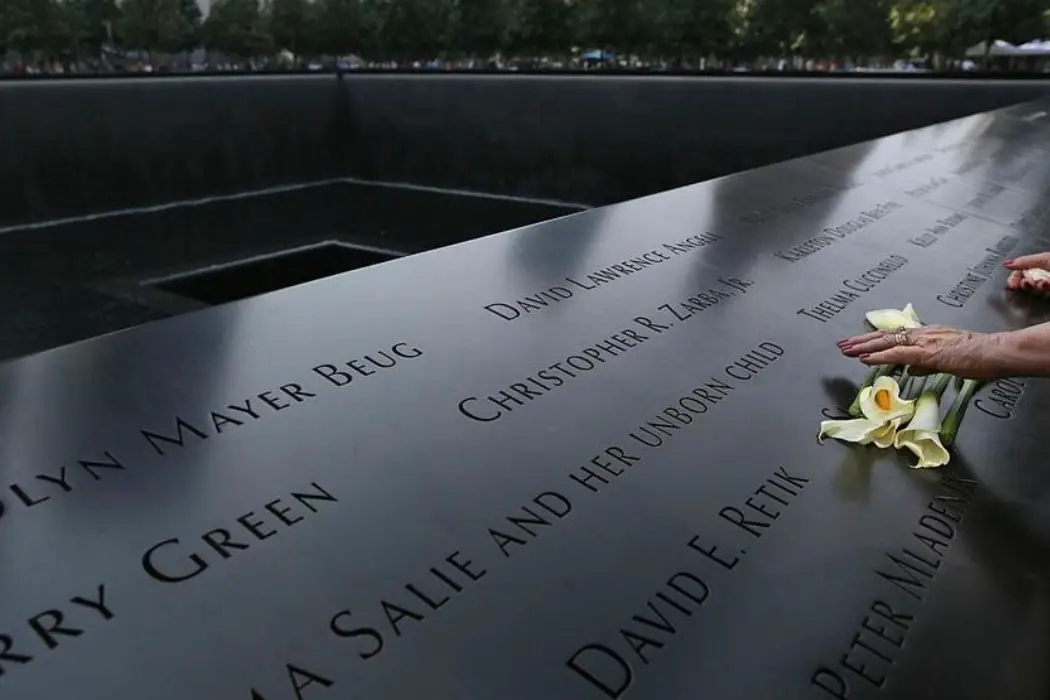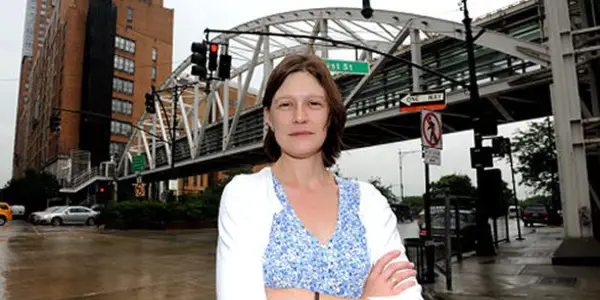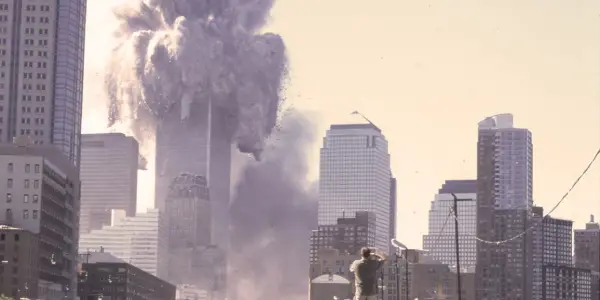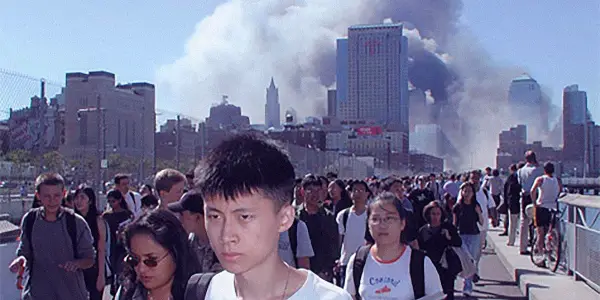Director Amy Schatz On Her Documentary IN THE SHADOW OF THE TOWERS: STUYVESANT HIGH ON 9/11

Stephanie Archer is 39 year old film fanatic living in…
Every year, as we mark the anniversary of lives lost and a renewed sense to never forget, new stories are told and new perspectives of what happened on September 11, 2001 come to light. A deeper understanding of that day is brought forward, giving comfort and understanding to some while providing a continued education for those that are to follow.
Director Amy Schatz has been a strong advocate towards the education of children on topics that need to be remembered and discussed but can be hard for adults to teach and communicate, and even harder for young ones to understand. Through her work, she has brought documentaries on school shootings, 9/11 and the Holocaust to life, answering the questions of the youth and filling a void in education. This year, on the 18th anniversary of 9/11, Schatz, with HBO, once again visits that day, this time from the eyes of the alumni of Stuyvesant High School who bore witness to the events in NYC that changed a country forever.
Stephanie Archer for Film Inquiry: Hi Amy. How are you?
Amy Schatz: I’m good. Thank you so much for writing about this piece.
Oh, no problem. Thank you for keeping the memory of 9/11 alive and those that were lost, as well as giving a voice to those that are still here, but that were affected on that day.
Amy Schatz: Yes, it’s very moving stuff.
It really was. And it was an amazing documentary. One of the things I wanted to ask you to start off was – one of the fellow students states that “people don’t talk about how there were kids there”. And it’s completely true. I was a high schooler at the time myself and I’ve never even thought of there being children at the time. What made you want to focus on this aspect of that day to shape your documentary?
Amy Schatz: Well, you know, it’s interesting because it began as a children’s show. I make documentaries for kids and I put in a lot of time talking with kids about difficult subjects about the world around us – about the environment, about subjects like gun violence. And so I was asked by HBO to make a film about 9/11 for kids that would help fill a void because there didn’t seem to be very much out there on the subject and kids weren’t learning about it in school. And so the question was, could we make a short documentary that would help explain some of what happened on that day to young kids. So that was the mandate in the beginning with a request by HBO for me to explore this. And it was a collaboration with the 9/11 Tribute Museum. So that started it all.
And one of the things that I thought might be interesting would be to talk with people who were students at the time, that were young people, to try to be able to see and to feel what had happened on that day through the eyes of young people. What I didn’t anticipate when I started to interview these alumni who had been at Stuyvesant High School, which is just a few blocks away from what was the World Trade Center, is how incredibly disturbing and really, really tough their experiences were during that day and then the aftermath. So again, it started as a children’s show, and it felt like we had another film in the material, one that was for an older audience, for high school kids and beyond, that was about the powerful experiences of these young people. You know, 13, 14, 15, 16 year olds kids.
Were you in New York at the time?
No, I’m actually from Connecticut.
Amy Schatz: You were in high School in Connecticut so that is very close by.
Yes. Very close by. You mentioned that HBO had reached out to you because they were not learning in schools, which is really surprising. I actually had no idea about that. Do you personally feel like 9/11 is being forgotten, especially with this upcoming generation of kids?
Amy Schatz: Well I don’t really – I’m not in the schools and I’m not an educator, so I’m actually not quite sure if it’s in anyone’s curriculum right now. HBO was in conversation with the 9/11 Tribute Museum who thought there could be a teaching tool developed, which would help to fill any need of this kind to explore this subject matter. So I think, you know, just looking at my own kids – they’re now teenagers. I think we had one children’s book about 9/11, which was about a fire boat that did some rescue work during 9/11. But they don’t really know the details, they didn’t really learn about it very much. So I do think just in my own experience, I don’t think that I came across much about it in my parenting of young kids.

So we made a film, which is called What Happened on September 11th. That’s not the film we’re talking about right now, but that film we did make – and will be on HBO Family on September 11 at 6:00 PM – but this other material that we filmed, these interviews really felt like they were, they were something else. There’s something very raw in these stories. There was heartbreak. There’s loss, there’s fear, there’s a very visceral experience not only of the day itself, but also about the negative aftermath, the negative effects of 9/11 in these students’ lives, which we felt wasn’t father for a children show.
And that visceral experience that you talk about, that really comes through during the film. Just the describing of putting backpacks on air conditioners and evacuating the school, the way that it’s edited and put all together, it feels so real. You could feel like you were there.
Amy Schatz: I have to say that it didn’t require a lot, we just let the stories be told and you know, it’s interesting how much these students remembered. I just basically started by asking them, can you tell me about your commute to school? Like my interview questions were very child friendly because I thought, oh well let’s talk about breakfast. Let’s talk about getting to school. Let’s talk about – then as soon as I asked them about the morning of September 11th all of these very vivid memories came forth – the putting the backpacks on the air conditioning vents, the smell of that area, the dust cloud chasing them, lack of cell phones, not being able to get home; like all of the Odyssey really of their journey home were very present for them.
Why did you or HBO decided to release this documentary on the 18th anniversary – this year specifically? Was there anything behind that decision?
Amy Schatz: No. I mean, I began this project a year ago and I think that it always was intended to be airing on an anniversary, but it just happened that we began this project last year and it was ready. So I think that, you know, I don’t really – I’m not the scheduling department at HBO. I don’t feel like, I think just that we had finished it and it was time to release it into the world. That’s a good question. I should ask them about that. But you know when I started to talk to people, it wasn’t as though 18 years had gone by. It was as if it felt almost like yesterday when I was listening to their stories. So, the resonance that one feels in the stories about our world today, makes it a really appropriate time for this to be out there and to be seen because a lot of what they’re talking about, it’s about America and how America changed on 9/11 and they’re talking about our world today. So it seems to be really interesting this day and this time. I don’t know if you felt that way, but it speaks to our world.
Yes, yes it did. It really does. There were a lot of parallels in your film that really resonate for today. Speaking of that, how does our world today, for you, speak to how we’ve grown or not grown these 18 years?
Amy Schatz: Well, I think that story that we’re hearing from some of the individuals that are in the film is that that 9/11 changed things for many of these individuals and their families, in particular minority people of color and immigrant communities, and this is what the film discusses in – let me just think about that. I feel like I am getting lost from what your question was. The question was – you asked, has the world been affected by 9/11?
From that time in 2001 to now, as a country, how do you feel that we’ve grown or not grown in this 18 year time period?
Amy Schatz: Well, it seems as if the film reflects issues that our country is grappling with today that emerged in the weeks after 9/11. And from the experiences of Mohammad Haque, who talks about being a Muslim American, and Ilya Feldsherov, who talks about the immigrant communities, their stories speak to the fact that there are still some problems in our world today that were born on that day that could use some fixing. And I think the film ultimately has an optimistic message about who is American and what is America and what America aspires to and what America is. And there’s a hopefulness in the film from these interviews about what America stands for. And I think that’s quite beautiful, despite the fact that they’re talking about the ugliness that emerged on 9/11.
I have to agree that.
Amy Schatz: I don’t know if that answers your question. I’m sorry.

No, no, that was perfect. Yes. And I do have to agree that it does resonate from the what it is to be American. One of the things that I kept constantly thinking of in the beginning and at the end is this American dream and this need to fight for the American dream. I thought that was a very great point from the film that really stood out.
Amy Schatz: Yeah. I mean, the other piece of it is that Stuyvesant High School is a character in the film and what many of the interviewees talked about is how going to this high school, this prestigious high school, was part of the American dream. That there’s something about – you can through education better yourself and live the American dream. So I think that the story about the community at Stuyvesant is a really powerful one. How they all came together through this tragedy and supported each other and loved each other and had hot political debates. But nonetheless, were united during this time. I think it’s a really a beautiful message.
There is a vast, seemingly endless, amount of information and material to showcase from 9/11 – even with this one angle that you chose. Why did you choose the short film medium to encompass your story?
Amy Schatz: As I mentioned, this film was a surprise. The interviews didn’t fit into our children’s film, so they were almost like on the cutting room floor in a way. They were so powerful and there was a treasure trove of material in there and we realized that they were a film in themselves, but we hadn’t gone out to make this film about Stuyvesant High School. We discovered it in the edit room. And so, we basically took the materials that we had and gave shape to them. So the duration of the film really was because this is the amount of material we had and we let the story speak and let them be the lesson that they were. That’s what we had. Does that make sense?
Yes, it does. How did you find the former students to interview and join the initial project and transfer into to this project?
Amy Schatz: So I was very interested in the Stuyvesant students I had read about and had seen a play that they had put on in 2001 and 2002 about September 11th – it was called With Their Eyes and it was a school production. And I was interested in that because I thought, well, maybe there’s a way to talk to these students who worked on this play and that might be interesting for kids. And so a lot of the participants in the film had been in that play in 2001 or 2002. So that was my way in. That’s how I found them. And that’s how I found most of them.
There have been articles throughout the 18 years, since 9/11, addressing the lack of attention by the country for those who fell or jumped from the towers that day. Why did you choose to include that in your documentary?
Amy Schatz: You know, for me, it’s really hard to watch the images of people who jumped. I have a really hard time with it. And personally, I grappled with “do we include that or do we not”. It seemed important to include those two images we have in the film. It explains also why the trauma was so acute for these people who were children and it gives you a sense of what the atmosphere was like, kind of the desperation and the incredible violence that these young people saw. So, it’s always a struggle. Like, what do you show? You know, all we had in our toolkit where these talking interviews and archival photos and footage. So those were the basic elements of this film. And so we tried to show at times and just allow the interviewees to speak and just see their faces on camera. So I think that in some cases we showed what students were talking about. In some cases we just saw their faces, but it was a balance, you know, we wanted to visualize were we could what they were saying and what they were seeing.

That makes complete sense. I’m glad that it was included because it is a part of the day of everything that happened. It was enlightening and also disheartening to hear the former students talk about the hate some of them received on the walk home after the towers fell. Did you know how quickly the hate ignited or were you as surprised to hear as I am, and I’m sure many viewers will be – how instantaneous it was?
Amy Schatz: Yeah. I think that was very shocking. And that two of the students recounted stories of anti-Muslim sentiment immediately after the evacuation from school – that was stunning. The fact that it was ignited so quickly, that really did surprise me. I found it very heartbreaking to hear about the families of the students, being fearful, toward the lives of their kids and being fearful that there would be some misguided, misdirected fear and anger and hostility towards these kids of color. I think it was all really stunning how quickly all of that started.
I was watching the short and hearing them say that, it was really a shock because you only heard in the news, you know, all the riots and the attacks, people taking it out on New York citizens and other citizens around the country. You only heard about it a couple of weeks after and all the news came out and the information.
Amy Schatz: And Himanshu talks about how, “there were people cat calling me. No, go back to where you came from”. And these are American kids obviously, and he has this great line where he recalled saying, “We’re trying to go to Queens, we’re trying to go home to Queens”, you know, asserting like “we’re Americans, we belong here”.
Making the same walk you are.
Amy Schatz: Right. Exactly.
Immigration is heavily showcased in the film, both of the children whose parents immigrated to give them a better life and those who were affected by this hate in the aftermath – and the 18 years since the towers fell. How do you feel our country has grown with regards to immigration?
Amy Schatz: Um, you know, I can’t really speak to that – let me think about what I can say from the film’s point of view. I think that the film talks about the value of immigrants to our world. And the film talks about these students, many of whom are first or second generation immigrants, who are incredibly eloquent, who suffered along with all of us during 9/11 and to talk about the great optimism about this country. And also how immigrants have made this country great. And how, as some of them described, immigrants helped rebuild lower Manhattan. So I think that there’s a great deep respect for immigrants in the film and it’s almost a love letter to American diversity and tolerance and also the beauty of New York and how New York is made up of many, many different kinds of people who are great, united and unite in tragedy
And that is something that for a brief period afterward, there was that unity.
Amy Schatz: Right. I remember that.
You have mentioned what started all of this was the children’s documentary What Happened on September 11. Looking back on both films, what is the feeling of capturing two documentaries of that day – one for the eyes of children today and one from the eyes who were children then?
Amy Schatz: I think the one that’s for children is really just trying to fill in some historical information. This happened on this day, these are the details. Just to try to answer kids questions. I like to start talking to kids by asking them what questions they have and the questions that emerge were things like what exactly happened? You know, it wasn’t an accident, we know it was a terror attack, but what exactly was going on that day and why. They all wanted to know why – why. Why would somebody do this?
So the film attempts to answer some of these questions for kids. I mean, a lot of the kids I spoke to, real little, little kids, talked about Google searching 9/11 and seeing some very terrible, terrible things, but not really understanding or not really having anybody explain what exactly happened on that day and also that they’re safe. So I think the difference between making a show for kids and this other film, which is really from the point of view of people who were kids – their lives were in danger. I think the idea of them not being able to get home to their parents as young as 13, not being able to make a phone call and not knowing how to get home. That to me is as haunting and disturbing as the building collapse. Just that idea that your a young person all alone not being able to get home, I think that’s a very different, unsettling thing to present to young people.
I agree. There’s so much within the film that will resonate with audiences, I think no matter the age, especially those who themselves were high schoolers at the time, watching the towers fall on their own TVs. What do you hope audiences will take away from their viewing?
Amy Schatz: What I hope audiences will take away from this is just a sense of the complexity and that there’s meaning in revealing and looking at things from different points of view. I think that the film affords a new and unique perspective on 9/11 and it’s maybe a quieter point of view, but it’s a population of people who were deeply affected and whose lives were changed on that day. And I think hearing personal stories to fill in what happens in history is a really interesting, what’s the word? It’s just a really interesting thing to do. You know, I’ve made some about the Holocaust also in which I’ve had an Auschwitz survivor describing his experience to his great grandchild and the personal story that makes the thing come to life and makes it where you can feel the struggle. I think it’s really interesting and informative.
Film Inquiry would like to thank Amy Schatz for speaking with us!
Watch In the Shadow of the Towers: Stuyvesant High on 9/11
Does content like this matter to you?
Become a Member and support film journalism. Unlock access to all of Film Inquiry`s great articles. Join a community of like-minded readers who are passionate about cinema - get access to our private members Network, give back to independent filmmakers, and more.













